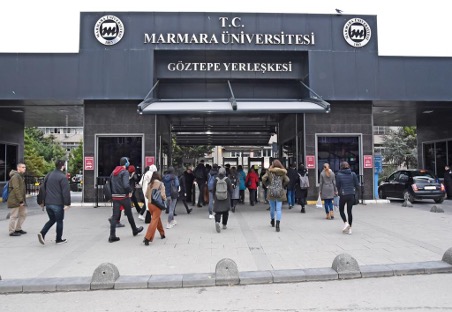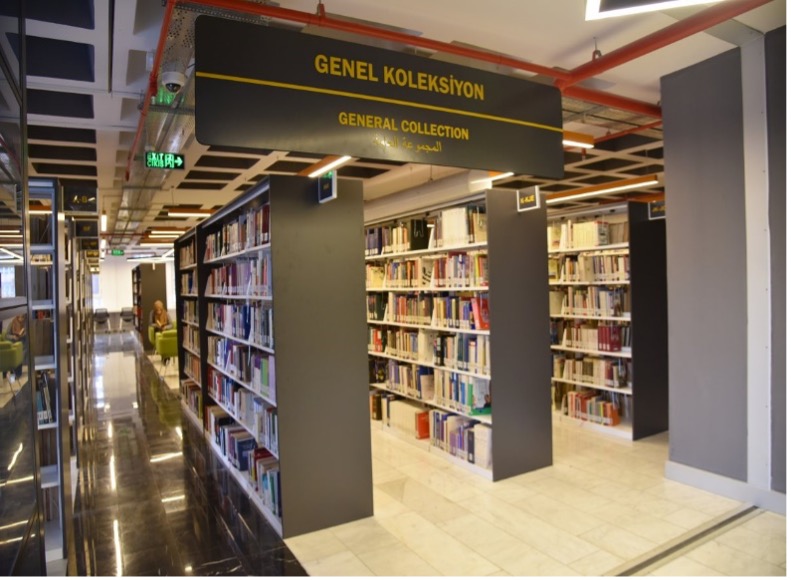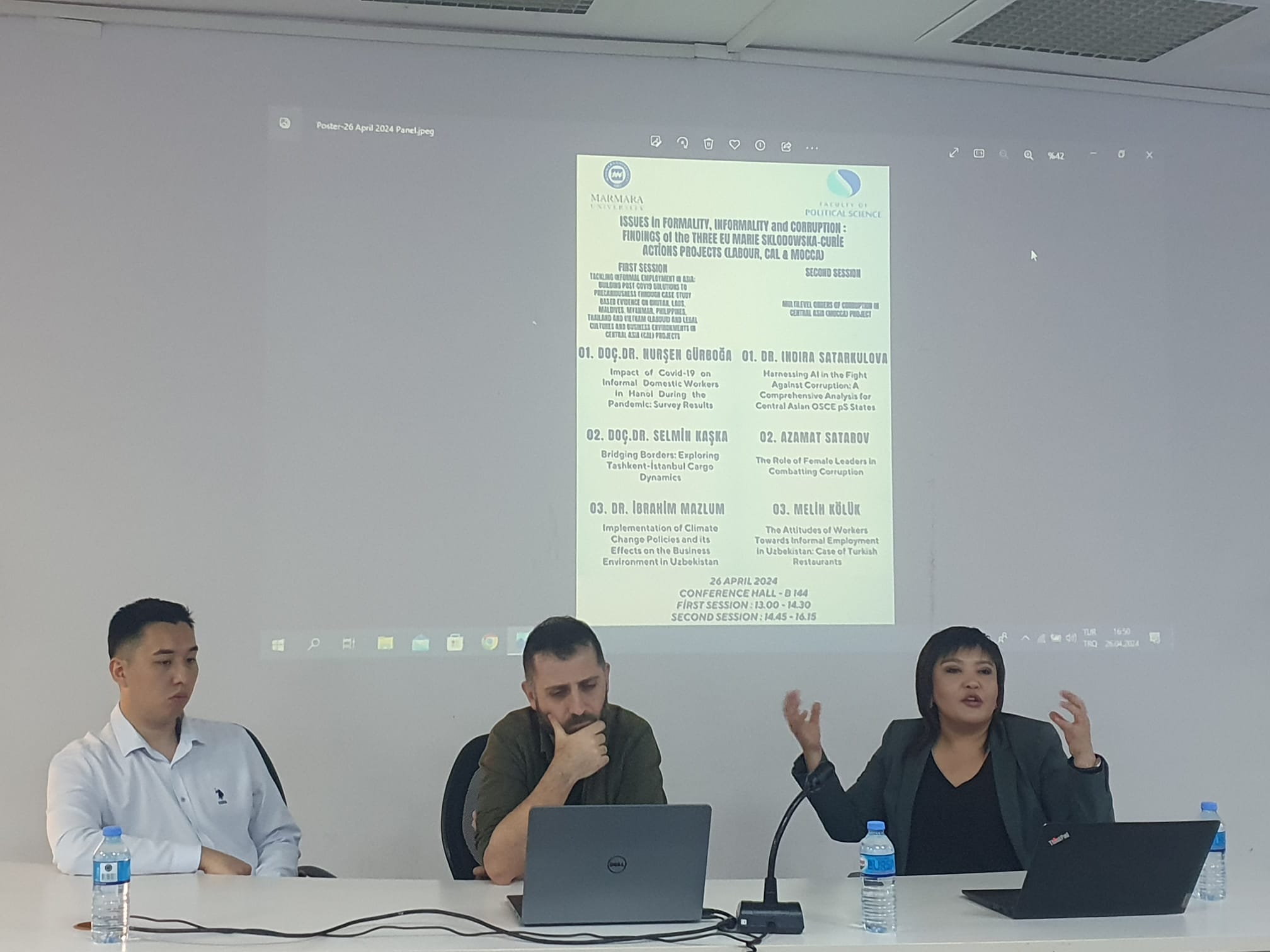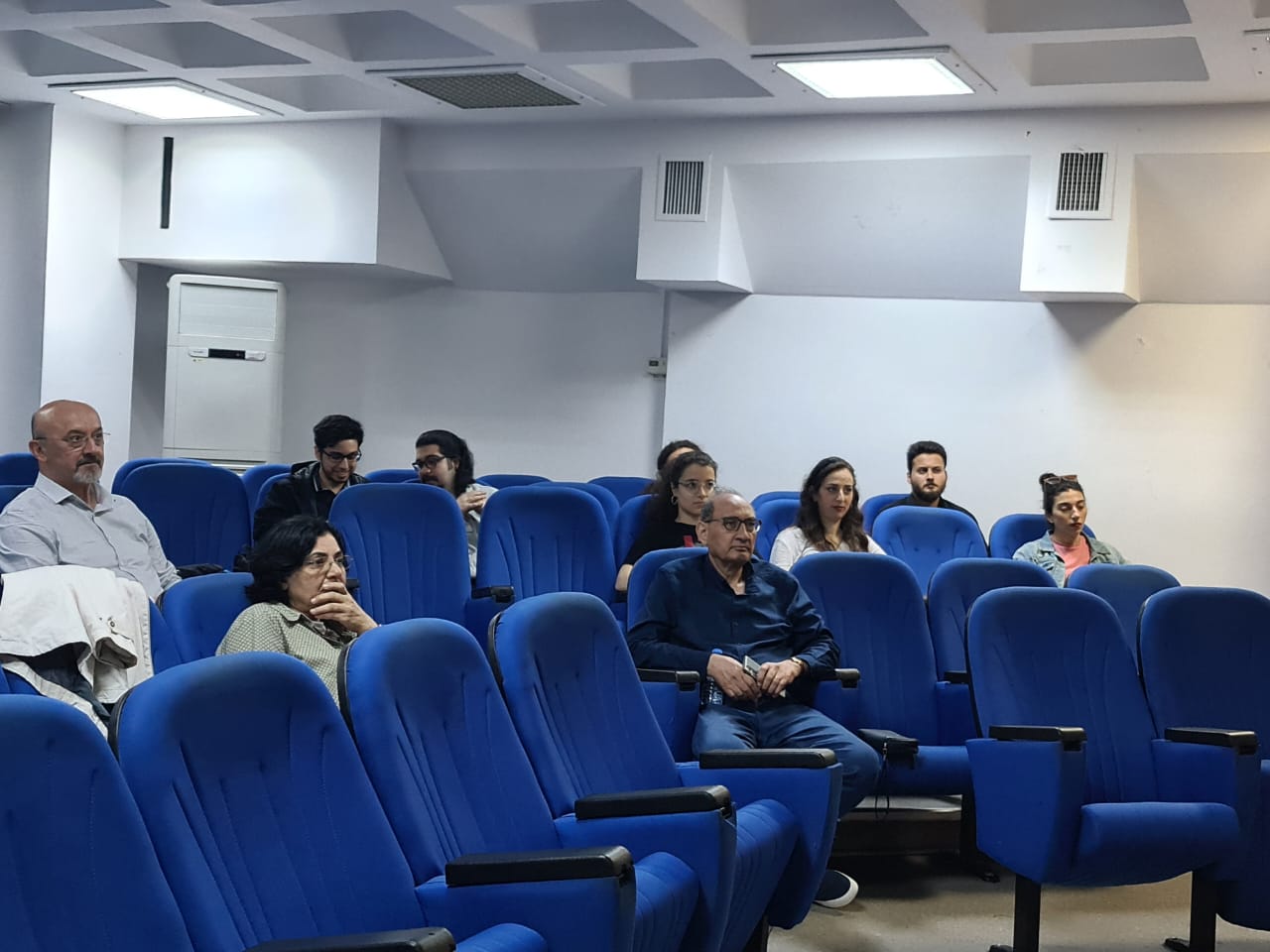By Dr Indira Satarkulova, researcher, Deputy Director of the OSCE Academy in Bishkek, Kyrgyzstan
 Marmara University entrance image, digital photograph, accessed on 04 May 2024, <https://www.marmara.edu.tr/universite/yerleskeler>
Marmara University entrance image, digital photograph, accessed on 04 May 2024, <https://www.marmara.edu.tr/universite/yerleskeler>
Dear readers, from the beginning of 2023 the OSCE Academy in Bishkek is proud to be a Central Asian project partner of the “MOCCA: Multilevel Orders of Corruption in Central Asia,” a Horizon 2021 project led by the University of Lund, Sweden. Today I am excited to share my 1-month research experience at Marmara University, one of the oldest and reputable educational institutions in Türkiye established on 16 January 1883 under the name Hamidiye Ticaret Mekteb-i Âlisi, and affiliated with the Commercial, Agriculture, Forestry and Mining industry. The first 13 graduates matriculated in 1887 but today it provides educational services to approximately 75,000 students, of whom about 2,000 are foreign students.
This was my first secondment and the very start of the research work. Upon my arrival, the Marmara University and staff from the Faculty of Political Sciences welcomed me warmly in one of its largest campuses located in Göztepe. During the first days of the field work, I had the opportunity to familiarize myself with the hosting university and the resources it had to offer. I was amazed with the scale of educational approach and care at the university: spacious classrooms and conference rooms, installed technical equipment sustaining high quality of education, careful attention paid to the security level at the university, coffee shops, green zones and beautiful library, established in 1997.

Marmara University Library image, digital photograph, accessed on 17 April 2024, < https://kutuphane.marmara.edu.tr/en/presidential/gallery>
Its building was constructed utilizing advanced technological facilities: large and bright reading rooms to provide readers with comfort while carrying out their activities. Only Book Chapter containing general collections serves an area of over 1000 m² and offers books in 68 languages. It also contains a rare books library collection which is open to all researchers and students willing to work with 1964 Manuscripts, 6781 Printed Books with Old Letters, 581 Rare Books with Latin Letters, 715 Volumes of Periodicals, a total of 1,721,000 pages of the Digital Collection.


On 25 April 2024, I was delighted to receive an invitation to meet with the students and faculty of the Marmara University and deliver a presentation about the OSCE Academy, its programmatic and research activities as well as about the education system in Kyrgyzstan in general. I was very pleased to learn how students of Marmara University are interested in education and eager to use opportunities to explore foreign countries and study abroad.


On 26 April 2024, a research seminar on “Issues in Formality, Informality and Corruption: Findings of the Three EU Maria Skłodowska-Curie Actions Projects”, was organized by Dr Ibrahim Mazlum and his team. The presentations were divided into 2 panels allowing 6 researchers to introduce themselves, their project works and engage into discussions and interactive sessions with the students and faculty. During the seminar I presented the MOCCA project and the selected research topic “Harnessing AI in the Fight Against Corruption: A Comprehensive Analysis for Central Asian OSCE pS.”
To gain invaluable insights into the research’s vision and its potential impact on the field of economics and corruption through international perspective, I was happy to meet online with Ms Salomé Flores Sierra Franzoni, Head of the UNODC Information Centre for researching and analyzing transnational threats related to drugs and crime in Tashkent, Uzbekistan. We shared our experiences, asked and answered questions and learned valuable information about the GRACE Initiative, which offers resources to educate on corruption related matters, the UNODC publication on gender and corruption which is called “The Time is now”. Salome kindly shared the resolution of the Conference of State Parties on the measurement of corruption and the statistical framework to measure corruption and introduced me to the UNODC work on the private sector and the prevention of corruption.
An online meeting with the representatives of the Transparency International is anticipated.
On 07 May Dr Ibrahim Mazlum has invited for a meeting with Prof Nuri Tınaz, Director General, Office for International Relations and Academic Cooperation. We discussed our field work via MOCCA project and potential future cooperation between Marmara University and the OSCE Academy in Bishkek.

On 09 May I was honored to be invited as a guest lecture and deliver a lecture to the students of Marmara University (IR faculty) on “Introduction to International Arbitration”. My lecture was conjoined with the course taught by Prof. Necdet Umur Orcan on International Law.

During my field work I had a great opportunity to think on a trigger or catalyst of my article, structure it, plan its objectives and methodology and start collecting available information and data. The use of Artificial Intelligence is a very hot research topic in the country today. In Türkiye in accordance with the Presidential Circular No. 2021/18 the “National Artificial Intelligence Strategy 2021-2025” (NAIS), prepared in cooperation with the Digital Transformation Office of the Presidency of the Republic of Türkiye and the Ministry of Industry and Technology, was entered into force. NAIS was prepared as per the Eleventh Development Plan and Presidential Annual Programs, in line with the “Digital Türkiye “Vision and the “National Technology Initiative”. Country is moving forward in accordance with the 6 strategic priorities:
- Training AI experts and increasing employment in the domain;
- Supporting research, entrepreneurship and innovation;
- Facilitating access to quality data and technical infrastructure;
- Regulating to accelerate socioeconomic adaptation;
- Strengthening international cooperation;
- Accelerating structural and labor transformation.
The Digital Transformation Office, established under the Digital State Strategy, manages Türkiye’s digitalization journey, including in the field of Artificial Intelligence (AI). Many investments are made in AI in Türkiye. Many universities offer AI learning departments (among them are: Istanbul Technical University, Bogazici University, Sabancı University, Bilkent University, Koç University, METU, Izmir Institute of Technology. From my understanding, there are many sectors, where in Türkiye AI is widely used: health care and health tourism, finance, retail, energy, logistics, and industry, whereas is Central Asian region the use of AI is on its start point and mostly used in finance sector to detect fraud, money laundering and etc. For comparative purposes it was interesting to explore the Türkiye’s overall legal commitments in the field of our project research topics. In is undisputable that the UN Convention against Corruption is considered as a landmark in the fight against corruption. Türkiye took part in the preparation works of the Ad Hoc Committee in Vienna and is among the first countries signed the Convention on 10 December 2003 and became party to the Convention on 9 December 2006. I learned that Türkiye also ratified the Council of Europe Civil and Criminal Law Conventions on Corruption and became a member of the Group of States against Corruption in 2004. Türkiye also ratified the Council of Europe’s Convention on Laundering, Search, Seizure and Confiscation of the Proceeds from Crime (1990) on 30 July 2004. As of today, Türkiye is a member of the Financial Action Task Force and a party to the OECD Convention on Combating Bribery of Foreign Public Officials in International Business Transactions and of the OECD Working Group on Bribery. There is no general anti-corruption or bribery law in Türkiye. However, Turkish legislation does contain provisions on anti-corruption: the Turkish Criminal Code (for example, article 252. Bribery of public officials), the Law on Declaration of Property and Combating Bribery and Corruption, the Law on the Ethics Board for Public Officials, and the Civil Servants Ethical Principles and Application Procedures and Principles. However, while working on my topic, it became obvious to me that corruption related matters are not easily discussed openly here and most materials must be searched and collected by the researchers in printed materials, international statistical reports, books, magazines and other publications. Among them was the Istanbul Anti-corruption Action Plan – a sub-regional peer review programme launched in 2003 in the framework of the CAN which supports anti-corruption reforms through country reviews and continuous monitoring of implementation of recommendations. For practical experience I hoped to meet with the related state officials in Türkiye. However, the initially planned meetings with the representatives of the General Prosecution Office, Ministry of National Defense, Ministry of Foreign Affairs, Ministry of Interior of Türkiye were not conducted due to two main reasons: 1) time limits (1 month of my stay was not enough to have them organized on a highly formal level), the venue of all mentioned state authorities is Ankara while I was stationed in Istanbul. This brought me to an idea that it would be highly quality and financially efficient for the Lund University project team to consider possibility of expansion of the MOCCA partnership network and invite other Turkish universities located in Ankara to join the project, which could widen secondment locations for the researchers and support their field works even more.
I would like to warmly thank the Marmara University staff, Dr Ibrahim Mazlum, Mr Melih Kölük, Research Assistant, Faculty of Political Sciences, for the provided support during my field work and cordially invite them to visit beautiful Kyrgyzstan and the OSCE Academy in the future.
My special words of gratitude go to the Department of Sociology of Law at Lund University and the project team whose joint professional investments made this secondment fast and professionally organized. I am looking forward to continue my research work further.
